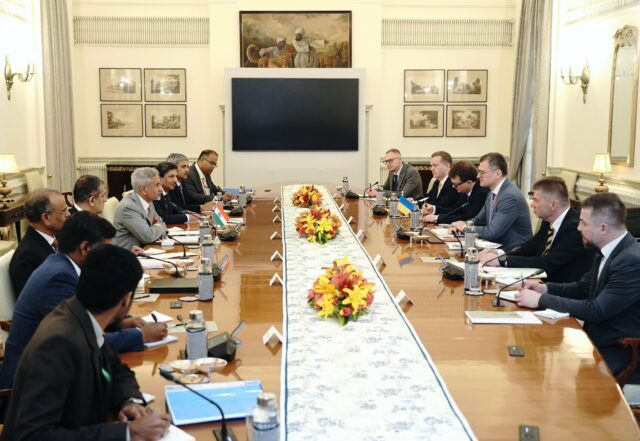For two sides wanting to reconnect on the back of a not so inspiring past, it was perhaps the best they could do. As hard as the Ukrainian Foreign Minister Dmytro Kuleba pushed his president’s 10-point peace formula that included the complete (and unrealistic) demand for the withdrawal of all Russian forces from Ukrainian soil, not to forget a war crimes trial, India appeared to ignore it.
Note Kuleba’s tweet on X. “In New Delhi, I had sincere and comprehensive talks with @DrSJaishankar about Ukrainian-Indian bilateral relations, the situation in our regions, and global security. We paid specific attention to the Peace Formula and next steps on the path of its implementation.”
His counterpart, Dr S Jaishankar, did not even refer to the Zelensky Peace Formula. But he echoed Kuleba’s remarks about restoring the bilateral relationship to what it existed prior to the Russian invasion.
“Pleased to co-chair the review meeting of our Inter-Governmental Commission with FM @DmytroKuleba of Ukraine. Noted the importance of further strengthening cooperation in all domains. Our immediate goal is to get trade back to earlier levels. Perspectives on trade, health, S&T and agriculture cooperation shared today were useful,” he wrote.
What happens now? In all likelihood, the two-year-old Zelensky formula will again do the rounds of the peace summit due to be held in Switzerland in June. It’s pretty clear the Zelensky formula offers no solution to ending the war. Why would Russia want peace when to many observers, it appears close to achieving its goals?
Some of these points may have figured in Kuleba’s meeting with Deputy NSA Vikram Misri, who was present at the meeting of national security advisers in Davos in January. Kuleba appeared eager to de-hyphenate India’s relationship with Ukraine, reiterating that Kyiv was not against India-Russia relationship, but that funding Russia’s war machine was a “red line” for his country. He was hopeful India would make its presence felt at the next peace summit in Switzerland.
“If India wants to lead, it has to move. Having India’s confirmation of support for the peace formula will mean having a big player on board. India is a voice that matters to others, especially in the Global South, and it will help to convince them,” he said during a press interaction with Indian media. Kuleba also spoke about a possible role for India in Ukraine’s post-war reconstruction and the need for expanding trade and technology ties. Already, both nations have agreed to restore trade back to pre-war levels. That may not amount to much given the war and the dislocation it has caused.
















